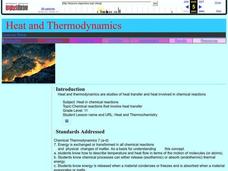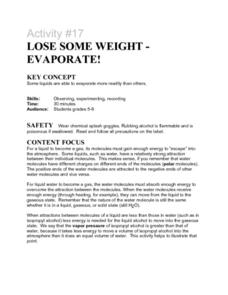Oceanic Research Group
Heat Transfer and Cooling
Astronauts train underwater to simulate the change in gravity. An out-of-this-world unit includes three hands-on activities, one teacher demonstration, and a discussion related to some of the challenges astronauts face. Scholars apply...
American Chemical Society
Evaporation
This is one in several lessons that explore the relationship between temperature and phase changes of water. After some discussion, elementary physical scientists place wet paper toweling on a hot and a room-temperature water bag and...
American Chemical Society
Changing State: Evaporation
Why do experiments require a control? Guide scholars through designing an experiment to see what they can do to evaporate water faster with a lesson that stresses the importance of controlling all variables. The second activity allows...
US Environmental Protection Agency
Water Purification by Evaporation and Condensation
This easy-to-perform demonstration shows students how the water cycle, specifically the processes of condensation and evaporation, purifies Earth's water supply. Just mix up some water, dirt, and gravel in a glass bowl, place a cup in...
NOAA
The Climate Team: Make a Solar Heat Engine
Learners investigate how solar energy is converted into heat in part two of the 10-part Discover Your Changing World series. They build and test homemade solar cookers to boil water and cook rice. Pupils consider the impact of heat...
CK-12 Foundation
Mineral Formation: Evaporating Lake
Get crazy for crystals! Junior geologists learn the secrets of crystal formation through lecture, reading, and examples. Other topics include common ionic compounds found in fresh and salt water, the effects of location on forming...
Curated OER
Who Wants to be a Millionaire? Changing State
A teacher with talent has created a fun set of review questions on the changing states of matter. Cycle through 15 questions, multiple choice answers, and a monetary reward for guessing correctly. Use this game show PowerPoint to help...
Curated OER
Heat and Thermodynamics
This is actually a 10-day mini unit on thermal energy for your high school chemists. Every avenue is taken to get learners absorbed in heat: a pretest, a PowerPoint presentation, Internet exploration, demonstrations, lab activities, and...
Curated OER
Evaporation Introductory Lesson
Fourth graders examine the concepts of evaporation and the water cycle. They describe the relationship between heat energy, evaporation and condensation of water on Earth and identify the sun as the source of energy that evaporates...
American Chemical Society
Energy Foundations
Only 10 percent of an incandescent bulb's energy is used to create light; the remaining 90 percent is heat. In the unit of activities, young chemists examine energy through hands-on activities, videos, discussions, and readings. Scholars...
Exploratorium
The Dipping Bird
If you have or want to order the dipping bird demonstration, it is useful for showing how evaporation and changes in the pressure of a closed system cause cyclical motion. After teaching about pressure, consider setting this little guy...
Virginia Department of Education
Heat and Thermal Energy Transfer
How does radiation affect our daily lives? Answer that question and others with a lesson that discusses radiation and its use in thermal energy transfer through electromagnetic waves. Pupils investigate vaporization and evaporation while...
Curated OER
Barometer and Boiling Points
Diagrams bring barometers to light in this PowerPoint. Several slides explain the structure and function of this apparatus. The relationship of air pressure to the processes of evaporation and boiling are also explained. This would be an...
Curated OER
The Hydrologic (Water) Cycle
Learners construct a model of the hydrologic cycle, and observe that water is an element of a cycle in the natural environment. They explain how the hydrologic cycle works and why it is important, and compare the hydrologic cycle to...
National Wildlife Federation
Get Your Techno On
Desert regions are hotter for multiple reasons; the lack of vegetation causes the sun's heat to go straight into the surface and the lack of moisture means none of the heat is being transferred into evaporation. This concept, and other...
Curated OER
Evaporation
Fourth graders study the water cycle and the different processes involved, specifically evaporation. They explore the processes of evaporation through hands-on collaborative activities and relate learning to life through...
Curated OER
Evaporation and Temperature Change
Young scholars investigate the relationship between evaporation and temperature changes. In this evaporation and changes in temperature lesson, students measure the changes in temperature of different solutions on a cotton ball.
Curated OER
Lose Some Weight- Evaporate!
Students determine that some liquids are able to evaporate more readily than others. They create a balance using cups and a ruler to determine which end of a strip dipped in alcohol or water evaporates the fastest, hence loses the most...
Science Geek
Thermochemical Calculations
Viewers learn where the heat goes when phase changes take place with a presentation that explains the latent heat of phase changes, or, more specifically, the molar heat of fusion, solidification, vaporization, and condensation. The show...
University of Minnesota
Homeostasis of Thermoregulation
Whether you're battling the flu or trying to warm up on a chilly day, your body's ability to react to temperature change is fascinating! Anatomy scholars discover the fantastic feedback loops that control body temperature in a rigorous...
Curated OER
Introduction to the Elements of the Water Cycle
The basic elements of the water cycle and how water is recycled through our environment is focused on in this lesson. Your students construct classroom terrariums and learn to make and record observations relating to the water cycle....
Curated OER
The Properties of Water: "Dead Or Alive"
Students study the water cycle and create a booklet entitled: "Discover the Wonder of Water" They observe and record data regarding evaporation, condensation, and precipitation and how water moves from a solid to a liquid to a gas. They...
Curated OER
Gravimetric Determination of the Nonvolatile Content of Paint
Here are the instructions for leading your advanced chemists though the process of measuring the nonvolatile components in a sample of paint. No student handout is provided, so you may want to create one based on the procedure explained....
American Chemical Society
The Water Cycle
Bring the water cycle into the classroom without the mess. Learners build a model of the water cycle using everyday materials. They observe the process of evaporation and condensation and relate their observations to the larger scale...

























